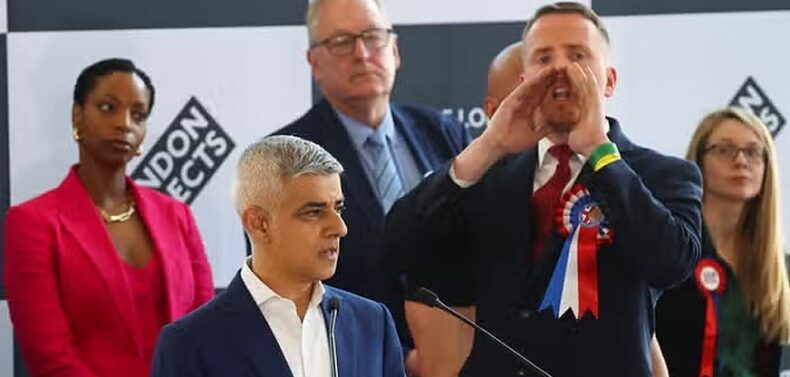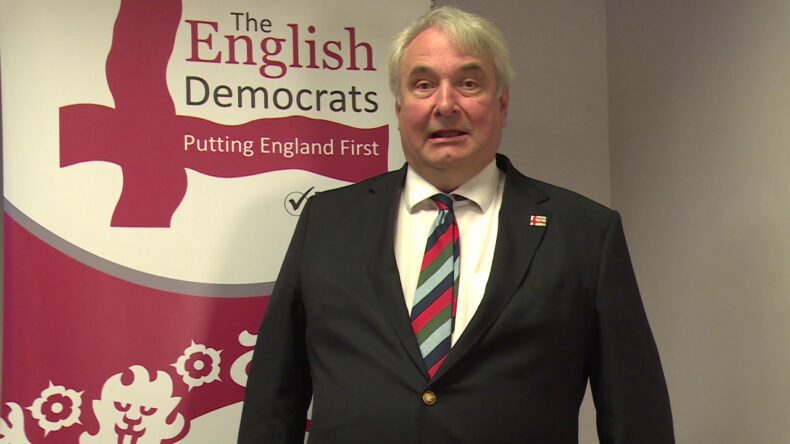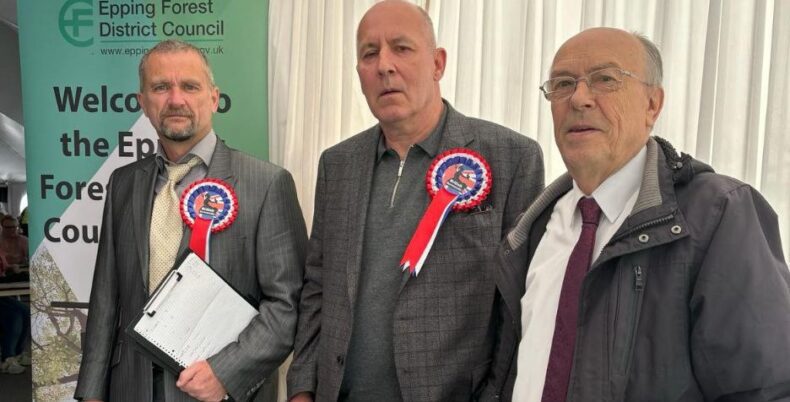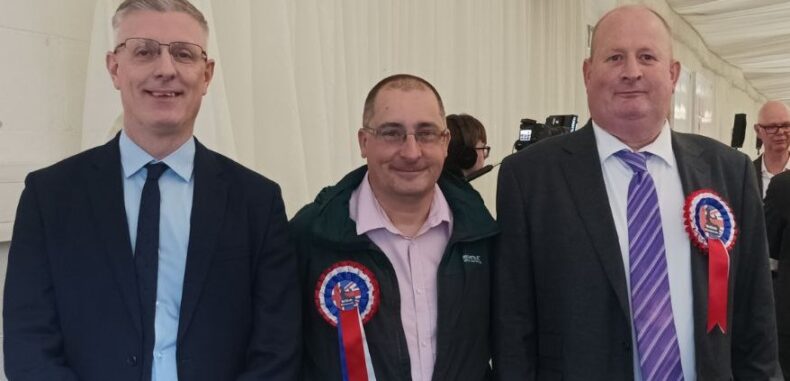
In 2023 rival factions lined up to become the new BNP and the new UKIP, each of those parties being obviously on the way to the knackers’ yard, and only remaining registered in the hope of inheritances from some aged nazi or senile Powellite.
At the 2024 local elections the competition is different. Who can claim the wooden spoon for the most embarrassing electoral failure?
It’s very difficult to choose between the hapless leaders of the three factions who used to march in step as part of Britain’s premier nazi outfit Patriotic Alternative.
PA’s Mark Collett desperately twisted arms last month among his wannabe stormtroopers, when he feared that his rival Kenny Smith, having registered his faction as the Homeland Party, would put up a credible slate of candidates.
It was a sad enough spectacle when Collett’s forces could only muster three candidates. But faces were even redder at the führer’s Yorkshire bunker when two of the three cocked up their nomination papers, leaving just one PA candidate (officially an independent due to Collett’s suspicious inability or unwillingness to register his cash cow with the Electoral Commission).
This single candidate, in Widnes, managed just 11.3%. Desperately spinning this underwhelming result, Collett and his deputy Laura Towler, in her spare time between prison visits to her criminal racist husband Sam Melia, have constantly repeated that PA was runner-up, while trying to avoid mention of his low vote. And absolutely no-one in PA now mentions the two candidates who got lost on their way to the starting gate.
Anything Collett’s PA can do badly, his hated rival Kenny Smith and the Homeland Party can, it seems, do even worse. For weeks Smith and his cadre of organisers, who quit PA to form what they promised would be a more “professional” political machine, boasted on social media about their great candidate Roger Robertson, an old ally of Smith’s in their BNP days.
Robertson cultivates the image of a country gent who has somehow amiably wandered through some of Britain’s most toxic racist parties, the BNP, For Britain, British Democrats, and now Homeland. He convinced Smith that he had a great chance of winning his council ward in the Hampshire village of Hartley Wintney.

Roger Robertson (front, centre) with Homeland A team…
So the obliging Homeland leader focused his entire party’s resources on this single ward and talked up the likelihood of victory. Apparently without thinking about the strange fact that Robertson had reached his advanced age without ever managing to get elected to anything above a parish council.
Was there perhaps some reason for this underachievement? Smith and his smart suited leader guard wouldn’t allow such a negative thought to cross their minds. Until the ballot boxes were opened, and Robertson was found to have won only 13.5% of his fellow villagers’ support.
It’s a measure of the electoral embarrassment suffered by both PA and Homeland that in their post-election analysis both Collett and Smith chose to concentrate not on their own failures, but on the fact that each of them had contributed to the election campaigns of another party, the English Democrats.
Collett “revealed” one of the worst kept secrets in British fascism, that he had been designing leaflets for English Democrat leader Robin Tilbrook and that his members in several southern English regions had leafletted in Tilbrook’s campaign for Essex Police and Crime Commissioner.

Robin Tilbrook – secretly helped by PA nazis
Perhaps this was Tilbrook’s idea of a balanced ticket? After all, he is a veteran solicitor, while PA has more experience of crime than any other political outfit in England. What other English party or group can claim such a high percentage of its senior activists presently in jail, for offences including terrorism?
Not to be outdone, despite his party having slightly fewer activists with experience of standing trial, Smith also boasted of the Homeland Party’s role in supporting the English Democrats’ Police Commissioner candidate in West Mercia, Henry Curteis.
Any member of a normal political party might ask their leader why, if they had so much time to spare to support the candidates of other parties, they didn’t invest this time in building their own party’s campaigns.
But for PA and Homeland, it’s now about seeking whatever crumbs of comfort might fall from a wealthy Essex solicitor’s table.
And these revelations by Collett and Smith surely erase the last shreds of respectability from Tilbrook’s operation, which has always been marketed as a “moderate” and multiracial organisation, but which has an inexplicable habit of jumping into bed with notorious nazis.
Back in the 2000s, Tilbrook eagerly collaborated with the England First Party, then led by Mark Cotterill, who was thrown out of the USA after campaigning for years with the most famous Klansman of the last half century, David Duke, and who for more than twenty years has edited the nazi magazine Heritage and Destiny.
The ED leader then moved on to work with Eddy Butler, former chief electoral strategist of the BNP and a man who once prowled the streets of London with Combat 18’s boot boys.
And now, after a few years of dalliance with eccentric conspiracy theorists on the fascist fringes, and a failed attempt to advise a London-based faction trying to take back control of the BNP, Tilbrook is allied to each of the main factions from Britain’s largest Hitler and Mosley fan club.
While Collett and Smith competed in obsequious cosying up to the English Democrats, the leader of the third splinter from the former PA is in a world of his own. Alek Yerbury has (unlike Collett) at least managed to register his group as a political party, though for reasons best known to himself the political arm is registered as National Rebirth Party, while his broader organisation is called National Support Detachment.
Yerbury’s party was registered only a few weeks before the elections, but he must know this excuse won’t wash forever. Unabashed, he is already regaling his Telegram readers with grand statements about how local council elections are small beer. His aim is nationwide power, in one fell swoop.

Alek Yerbury – nationwide power, in one fell swoop…
A march on London? A Wakefield beer hall putsch? Judging from the state of Yerbury’s followers at his sparsely attended rallies, the problem would be getting past the beer stage. Though we hear that some of his closest allies prefer other substances.
The only rival group prepared to speak to Yerbury and his eccentric partner Katie Fanning, are the Independent Nationalist Network. This group is mainly based in the West Midlands. In June they will stage a “seminar” on election strategy with none other than Nick Griffin, the man who until a month or so ago was telling his Twitter followers that elections were a waste of time.
Griffin has always seen consistency as an overrated political virtue, especially if it gets in the way of passing the collection bucket.
It really is difficult to choose among Collett, Smith and Yerbury as to which faction leader has most to be ashamed of following 2024’s election cycle.
What of another former rival of Collett’s from the BNP days? Paul Golding preceded Collett as Nick Griffin’s blue-eyed boy. He disappeared for a while into the Essex rave scene, but then reappeared (or according to some suspicious observers was reactivated) as leader of the Islamophobic gang Britain First.
Golding’s pitch was as the thinking yob’s Tommy Robinson, and most of his followers were undeterred even after their leader’s then-partner Jayda Fransen accused him of domestic violence. It seems that the average Britain First foot soldier was if anything proud of being led by someone who beats up women in his spare time.
For a year or two Golding also seemed to have inherited the Midas touch from the far right’s most successful fundraiser Jim Dowson, who helped him create Britain First before moving on to a more lucrative grift with Nick Griffin.
And in the early post-Covid elections it looked as though Britain First had invested at least some of their profits wisely. Golding’s new partner Ashlea Simon won some of the best far right votes of the 2020s, taking 21.6% in Walkden North in 2022, and only slipping back slightly to 18.2% in 2023 even when opposed by a Reform UK candidate.
Then it all started to go wrong. Golding threw money at pointless campaigns in parliamentary by-elections. And when a by-election occurred in Rochdale this year, one of the few constituencies where Britain First’s Islam-bashing might have won more than a negligible audience, Golding’s team failed to nominate.
Worse than that, they sent out fundraising appeals for their Rochdale campaign even after nominations had closed and they knew there was no such campaign!
Stumbling from one embarrassing failure to another, Golding and Simon for some reason abandoned the only borough where they had ever won a decent vote. There were no Britain First candidates in Salford this year. Instead, they scraped together council campaigns in Cokeham (Sussex) and Coventry, managing 12.5% and 9%.
But the headline Britain First campaign was in London, and what an epic disaster it proved to be! Nick Scanlon, a former BNP member who was briefly in charge of the failed effort to create a British version of Generation Identity, stood for both Mayor of London and the GLA. The London Mayoral campaign seemed an ideal vehicle for an Islamophobic party whose followers liked nothing better than to scream about the capital city’s Mayor being a Muslim.
But the voters’ verdict was unmistakeable. Scanlon achieved one of the worst votes in the entire history of Britain’s far right, just 0.8% in the Mayoral contest against Sadiq Khan, and 1.3% in the GLA list section, which is designed to be favourable to smaller parties but couldn’t rescue Britain First from the gutter. Golding and Co were especially riled when taunted that their man was even beaten by comedy candidate Count Binface.

Nick Scanlon and (top) heckling Sadiq Khan at the London Mayoral count
The strange thing is that some fellow fascists are eager to follow Britain First into the fringe of the fringe. Even though he’s a member of a rival party, Welsh football hooligan and PA regional organiser Joe Marsh couldn’t resist tweeting about Britain First’s “cool banner drop”, 24 hours after their entire strategy had met with total disaster.
The problem for Marsh is that like most football yobs, he cares more about posing than about reality. He openly admits that he doesn’t really care about elections and prefers marches and demos, and he is one of the chief architects of PA’s own strategy of banner drops, intimidatory demos outside asylum accommodation, and homophobic thuggery.
Marsh and his fellow PA organisers are addicted to failure, which helps justify their preferred strategy of giving up on their fellow Britons and retreating into “nationalist communities”. This approach of creating White enclaves has been tried several times in the USA. PA’s activists spend most of their time online, so it’s not surprising that they have been influenced by American examples. Judging from the number of PA activists doing jail time, it seems that some of them are also influenced by the terroristic strategy often followed by those who go down this route. Withdrawing from society all too often means being at war with society.
Just when Searchlight’s judging panel was thinking about awarding the wooden spoon to Britain First, along came an undisputed winner. No one in fringe politics is more expert at making a fool of himself than Laurence Fox, whose entire acting career seems to have been a rehearsal for his present role as the ultimate delusional conspiracy theorist.

Lozza (or Looza?) Fox….
A month ago, Fox failed to nominate in the Mayoral election, thus missing out on the chance to compete with Britain First’s Nick Scanlon in the sub-1% fascist fringe category, Nevertheless, he grabbed his share of the limelight by persuading just 0.6% of Londoners to vote for him on the GLA ballot paper. His epic Twitter tantrum after the results were published, in which Fox announced he was moving out of London, presumably in search of a town where he might at least poll 1%, seals his victory as the far right’s biggest embarrassment of 2024.
Two parties on the far right achieved what superficially might seem more credible results, but when looked at in context even their supporters will surely be disappointed.
Three of the four British Democrat council candidates polled over 10%, the exception being party chairman Jim Lewthwaite who managed only 6.8% in Wyke ward, Bradford, where voters were unimpressed by his past as a BNP councillor.
Another ex-BNP councillor standing for the British Democrats was Julian Leppert, who polled 21.9% in Waltham Abbey North, Epping Forest. Boundary changes gave Leppert a real chance of getting back onto the council, since the new ward incorporated the area he used to represent as a For Britain councillor, and he had no opposition from Reform UK.

Epic fail Julian Leppert, left, at the count in Epping Forest
As Leppert was quick to complain later on social media, if the big talkers of the London far right scene had given him some practical help on the ground, he could have won. Recriminations are sure to follow, especially because the British Democrats, though few in number, are known for their factional splits.
One of the bitterest faction fighters in British fascism, ex-BNP activist Lawrence Rustem, took 17.8% in Maidstone, while yet another former BNP organiser Chris Bateman polled 14.3% in Basildon. Neither of them had Reform UK opposition.

Smiling Lawrence Rustem – before the count, that is
The verdict on the British Democrats must be that they avoided embarrassment, but after more than a decade of attempting to rebuild a BNP Mk II, they have clearly failed. The party’s septuagenarian leaders Lewthwaite and Brons are likely to retire from active politics soon. Are the likes of Leppert, Rustem and Bateman truly capable of leading a national party?
And what of the UK’s main far right force, the expert dog whistlers of Reform UK?
Nigel Farage, who effectively owns Reform UK already, is strongly rumoured to be coming out of retirement to take the leadership from his lacklustre substitute Richard Tice. The party had one electoral performance to boast about last Thursday, when they finished a strong third in the Blackpool South parliamentary by-election with 16.9%.
But elsewhere Reform UK’s results were pathetic, for a party that is endlessly boosted by the right-wing press and especially by the GB News channel.
They lost all three of the council wards they were defending, admittedly in seats that had been won in the first place by Conservatives who had defected to Reform.
They did manage to scrape onto the GLA with a single seat after polling 5.9% across the capital. But this was below the 6.5% that UKIP managed in the equivalent election in 2016, and the 8.4% that UKIP took in 2004. At each of these elections UKIP won two GLA seats.
This is not a performance that comes close to matching Reform’s opinion poll ratings. Does Farage have the stomach for the fight that will be needed to knock the party into fighting shape?
Outside London, Reform did manage to gain two seats in the Hampshire borough of Havant. But this seemed to owe more to Tory unpopularity, and Labour’s failure to field full slates of
candidates, than to any genuine advance by Reform. One of their winning councillors was elected with only 18% of the vote.
Only 21 Reform candidates in the whole of England managed to poll above 20%. More than 140 of their candidates finished below 10% of the vote, including notable failures in mayoral campaigns in London (3.1%), the West Midlands (5.8%), and Greater Manchester (7.5%).
The latter failure was especially notable, after Tice’s gloating about his success in persuading Dan Barker, originally selected as the Tory mayoral candidate, to defect to Reform.
Three strong Reform council results (between 27.7% and 30.1%) were in Barnsley, a borough that once had a strong BNP branch and which went on to elect councillors from the UKIP splinter group “Democrats & Veterans” in 2019. Unsurprisingly it was in one of these Barnsley wards, Darfield, that Reform polled 30.1% last week. The best Reform result was in Sunderland, which has one of the party’s few strong branches. In Redhill ward (which elected a UKIP councillor in 2019) Reform’s candidate polled 32.3%.
But the failure to win either of these target wards (or to win anywhere else apart from those two Havant seats) means that potential Tory defectors will be thinking very carefully.
As has so often been the case, Tice can take comfort in the total failure of the rump UKIP and the rival UKIP splinter party Heritage. The other parties that broke away from UKIP in past years seem to have disappeared completely.
UKIP had only three results above 10%, two of them in Tamworth, while the Heritage Party’s best vote was 9.7% in Broadfield ward, Crawley.
Half of UKIP’s candidates and the vast majority of Heritage candidates polled below 5%: in fact, twelve of the Heritage candidates were below 2%. As Searchlight and quite a few former UKIP members themselves have commented, the party’s chairman/owner now seems interested solely in controlling its bank accounts and future legacies. There is no expectation that UKIP will ever again be a serious electoral force.
Nor can Heritage have any such hopes. Its leader David Kurten increasingly focuses on conspiracy theories about Covid vaccines and other topics that interest the tiny online cult that constitutes his party.
How should anti-fascists sum up these elections?
As the far right themselves admit, this year was a new low for the British fascist movement. But we have seen similar low points before, and there should be no complacency.
In particular, the strong votes for Reform in certain areas are cause for concern. They might be nowhere near the level that would give Reform an electoral breakthrough, but they add up to a disturbingly large pool of long-term discontent and even despair.
Political disengagement, especially in working class communities, is also reflected in low turnouts and votes for independents and local pressure groups. Searchlight has seen before how this disengagement and despair can be exploited by the far right. While Britain’s defeated nazis lick their wounds and regroup, we must be ready for the next battle.






crofennog crofftwr says
But two from UkiP with more than 10% ?
Both in Tamworth ??
OK one of them as narrowly as is possible, a mere one vote fewer and the old Stonydeaf codger would have got 9.9%. But still !
Suspected contamination incident reported to South Staffs Water.
After the 2022 cyberattack on SSW, locals should be wary of what’s in the tap.
Specially if it causes Stupid. They’re thick enough there already, having elected a pincher called Pincher !
We Remember says
The connection between poor Economic performance, translated to real poverty in Working Class communities, and their subsequent attraction to Far Right and Nazi politics, is well known. It thus remains one of the ABSOLUTE sovereign duties of elected National government in Westminster to boost the well-being and employment and wages in these communities. This is one of the many lessons Germany in the 1930’s teaches us: The Global Crash of 1929 led DIRECTLY to Hitler’s election in Germany in 1933. The poorest communities in the UK are on course to become even poorer than Poland by 2030, on current trends. Labour MUST reverse this if they win at the next General Election.